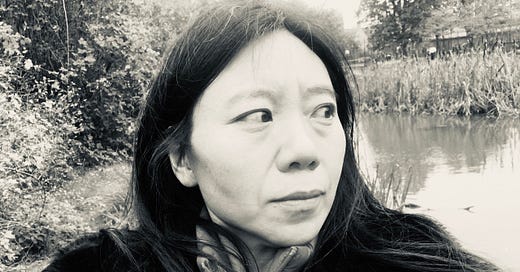Xiaolu Guo: ‘My first identity is as a writer’
The award-winning Chinese-British author and filmmaker on cross-cultural identity, Brexit, and trauma across the generations
Since moving to the UK in 2002, Xiaolu Guo has forged her own path and her own voice. The multi-award-winning Chinese-born author has penned novels, essays and memoirs in a career spanning over thirty years, as well as picking up trophies for her other passion: filmmaking.
Guo is a global citizen in every way, balancing work in Berlin and London with writing residencies in New York. Even her novels reflect her hectic travel schedule; 2014’s I Am Stone was set across three continents, whilst her memoir Once Upon A Time in the East maps her journey from East to West.
Her writing style is tethered to the foreign writers she grew up reading; she cites Roland Barthes and Italo Calvino as major influences on her work.
‘The authors I love were away from traditional narratives — classical, sealed, perfect storytelling — which I always had a problem with. I loved the books that have breezy flows, fragments, reflections, personal memories mixed with commentary on society.’
A Red Guard’s daughter
Her native country is ever-present in her filmography. 2004’s The Concrete Revolution explores China’s urban/rural divide through the lens of the construction industry, as stadiums shot up for the 2008 Beijing Olympics. Her second fiction film shot in 2009, She, a Chinese is a captivating snapshot of China’s young, burgeoning middle class seeking routes to the wider world.
It’s hard to imagine neither was influenced by Guo’s own childhood. A little-known fact about the author is that she was given away at birth, only to later learn she had a brother. ‘What’s gone on in China in the last century is so dramatic, and the drama is so condensed within a few generations’.
Guo adds that it’s normally beneficial for writers to be consumed by historical change, even if it can be traumatising.
‘Often you’ll listen to a Chinese person talk about their family history and think “my god, it’s so epic”’
Guo is no exception to her own rule. Her mother was a Red Guard, tasked with championing Chairman Mao’s cultural revolution, yet her father was a fisherman turned propaganda artist with a love for Van Gogh — a love he was punished for in a communist labour camp.
The beauty of broken English
Her first English-language book, A Concise Chinese-English Dictionary for Lovers, plays on the themes of Guo’s early experiences of making a home in another country.
The opening chapters are constructed in the broken English to be expected of a stranger in a strange land. But the cracks fade throughout the book as protagonist ‘Z’ picks up the language of her new country, making a sense of self in her new surroundings. The use of broken dialect as a character-building device led American author Ursula Le Guin to note, ‘we're in the hands of someone who knows how to tell a story’.
Guo’s exploration of the language/identity dynamic is based on lived experience, ‘When I write to my brother in China or my Chinese students, the email is in Chinese, and (there are different) codes in that language,’ she says. ‘I think it's really difficult for East Asians - especially the Chinese, Japanese, Korean people — in the European linguistic environment to make sense of themselves.’
Raised in a village south of Shanghai, Guo’s writing is a daily ritual that has mapped out her life’s twists and turns.
‘I see myself as an old writer, in a sense, I've been writing every day for the last 33 years — it's like drinking coffee or tea in the morning; I write. You live within that continuous identity as a writer — either as a Chinese, a British, or a German, that's your first identity as a writer. ‘But then eventually when you write a lot about yourself you say, “well, that's quite a story”.’
In A Lover’s Discourse, published in 2020, the boundaries between Guo’s personal diary and her characters are blurred again.
‘I was writing this book before the Brexit referendum’, explains Guo, ‘so it was interesting because I was commuting between Germany and the UK… then you suddenly realise, actually, you can't really work in Europe (after Brexit).’
‘So I think that changed the way I wrote the book; the political situation became so present. And I thought about how to use that in the characters, there should be a sort of crisis between the two lovers.’
‘It’s a very personal narrative for me, too. It’s always a question of, where shall we live?
Once you leave your country, everywhere is sort of the same, because it's never the first country - everywhere you adopt is secondary.’
Xiaolu Guo was in conversation with Angus Phillips, Director of the OICP, in association with the Confucius Institute at Oxford Brookes University, at the FT Weekend Oxford Literary Festival 2022. Find out more about Xiaolu’s life and works here.




